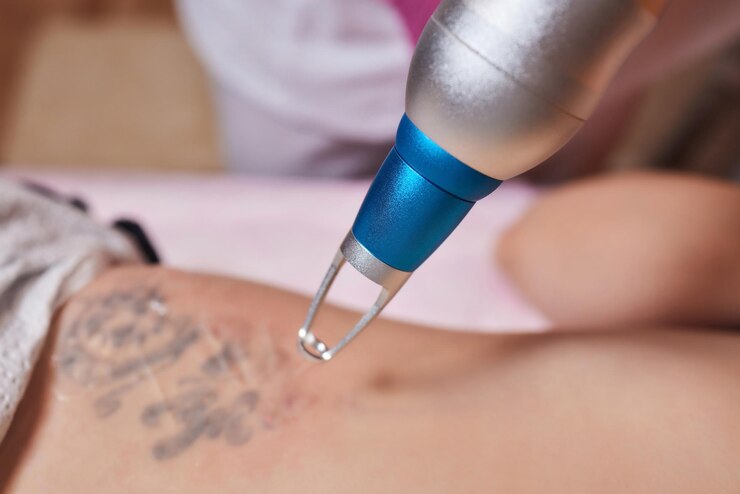Laser Tattoo Removal: Smooth Results

Tattoos can be deeply meaningful and personal, but there are times when individuals may wish to erase or alter their inked designs. Whether it's a faded old tattoo or a design that no longer resonates, laser tattoo removal offers an effective solution. With advancements in technology, this procedure has become increasingly popular for those seeking to achieve smooth and clear results. This article delves into the process of laser tattoo removal, its benefits, and what to expect during and after treatment.
Understanding Laser Tattoo Removal
Laser Tattoo Removal in Dubai is a procedure designed to break down the ink particles in the skin using laser technology. This method is widely regarded as the most effective and least invasive way to remove unwanted tattoos. The procedure works by emitting high-intensity laser beams that target the pigment in the tattoo. These laser beams penetrate the skin and fragment the ink into smaller particles, which are then naturally expelled by the body's immune system.
The Process of Laser Tattoo Removal
During a laser tattoo removal session, a specialized laser device is used to deliver short pulses of light to the tattooed area. The type of laser used and its wavelength will depend on the color and depth of the ink. The most commonly used lasers include Q-switched lasers, which are effective for a broad range of ink colors.
The procedure typically begins with the application of a cooling gel to the skin, designed to reduce discomfort during the treatment. Patients may experience a sensation similar to a rubber band snapping against the skin, though most find the procedure tolerable. The number of sessions required varies based on factors such as the tattoo's size, color, and location, as well as the individual's skin type and overall health.
Benefits of Laser Tattoo Removal
One of the primary benefits of laser tattoo removal is its ability to deliver smooth and clear results. Unlike other methods, such as dermabrasion or surgical excision, laser removal is non-invasive and minimizes the risk of scarring. Additionally, laser technology is highly precise, allowing practitioners to target the ink without affecting the surrounding skin.
Laser tattoo removal also offers significant improvements in the appearance of the treated area. Over time, as the body processes and eliminates the ink particles, the tattoo gradually fades, leaving behind a smoother and clearer surface. This process often results in minimal disruption to the skin, leading to a more even skin tone once healing is complete.
What to Expect During and After Treatment
Before undergoing laser tattoo removal, it's essential to consult with a qualified dermatologist or laser specialist. They will assess your tattoo and discuss the best treatment plan tailored to your needs. During the initial consultation, you'll also learn about the potential risks and aftercare requirements associated with the procedure.
The laser tattoo removal procedure itself typically lasts between 15 to 60 minutes, depending on the size and complexity of the tattoo. After the treatment, you may experience temporary redness, swelling, or discomfort in the treated area. These side effects are usually mild and subside within a few days.
Post-treatment care is crucial for achieving the best results. Patients are advised to keep the treated area clean and dry, avoid sun exposure, and follow any specific aftercare instructions provided by their practitioner. Applying a soothing ointment and avoiding activities that may irritate the skin will help promote healing and reduce the risk of complications.
Factors Affecting the Success of Laser Tattoo Removal
Several factors can influence the effectiveness of laser tattoo removal and the final outcome. These include the type and color of the ink used, the tattoo's age and location, and the individual's skin type. For example, black and dark blue inks generally respond better to laser treatment compared to lighter colors, such as yellow or green.
Additionally, the number of sessions required will vary depending on the tattoo's characteristics and the desired results. Some tattoos may require multiple treatments to achieve the desired level of fading or complete removal. Your practitioner will develop a customized plan based on these factors to ensure the best possible outcome.
The Future of Laser Tattoo Removal
As technology continues to advance, laser tattoo removal methods are expected to improve further, offering even better results with fewer sessions and less discomfort. Researchers are constantly working on developing new laser technologies and techniques to enhance the effectiveness of tattoo removal and reduce the risk of side effects.
In conclusion, laser tattoo removal is a highly effective and precise method for achieving smooth and clear results. With its ability to target and break down ink particles while minimizing the risk of scarring, it has become the preferred choice for many individuals seeking to erase or alter their tattoos. By understanding the process, benefits, and what to expect during and after treatment, you can make an informed decision about whether laser tattoo removal is right for you.